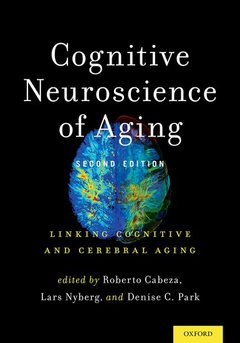Description
Cognitive Neuroscience of Aging (2nd Ed.)
Linking Cognitive and Cerebral Aging
Coordinators: Cabeza Roberto, Nyberg Lars, Park Denise
Language: English
Subjects for Cognitive Neuroscience of Aging:
Cognitive Neuroscience of Aging
Publication date: 12-2016
616 p. · 18.8x26.1 cm · Hardback
Publication date: 12-2016
616 p. · 18.8x26.1 cm · Hardback
Cognitive neuroscience of aging: linking cognitive and cerebral aging
Publication date: 01-2010
408 p. · 15.7x23.5 cm · Paperback
Publication date: 01-2010
408 p. · 15.7x23.5 cm · Paperback
Description
/li>Biography
/li>
Until very recently, our knowledge about the neural basis of cognitive aging was based on two disciplines that had very little contact with each other. Whereas the neuroscience of aging investigated the effects of aging on the brain independently of age-related changes in cognition, the cognitive psychology of aging investigated the effects of aging on cognition independently of age-related changes in the brain. The lack of communication between these two disciplines is currently being addressed by an increasing number of studies that focus on the relationships between cognitive aging and cerebral aging. This rapidly growing body of research has come to constitute a new discipline, which may be called cognitive neuroscience of aging. The goal of Cognitive Neuroscience of Aging is to introduce the reader to this new discipline at a level that is useful to both professionals and students in the domains of cognitive neuroscience, cognitive psychology, neuroscience, neuropsychology, neurology, and other, related areas. This book is divided into four main sections. The first section describes noninvasive measures of cerebral aging, including structural (e.g., volumetric MRI), chemical (e.g., dopamine PET), electrophysiological (e.g., ERPs), and hemodynamic (e.g., fMRI), and discusses how they can be linked to behavioral measures of cognitive aging. The second section reviews evidence for the effects of aging on neural activity during different cognitive functions, including perception and attention, imagery, working memory, long-term memory, and prospective memory. The third section focuses on clinical and applied topics, such as the distinction between healthy aging and Alzheimers disease and the use of cognitive training to ameliorate age-related cognitive decline. The last section describes theories that relate cognitive and cerebral aging, including models accounting for functional neuroimaging evidence and models supported by computer simulations. Taken together, the chapters in this volume provide the first unified and comprehensive overview of the new discipline of cognitive neuroscience of aging.
Roberto Cabeza is Professor in Psychological and Neuroscience at Duke University, where he is core faculty at the Center for Cognitive Neuroscience and senior fellow at the Center for the Study of Aging and Human Development. He has conducted pioneering studies on functional neuroimaging of aging, and he is the author of an influential model regarding the effects of aging on the lateralization of brain activations. In 2003, he received the Young Investigator Award of the Cognitive Neuroscience Society for his research on functional neuroimaging of memory and cognitive neuroscience of aging. Lars Nyberg received his Ph.D. in 1993 from Umeå University, then completed his postdoctoral research with Endel Tulving at Rotman Research Institute on PET studies of memory functions. He is currently Professor of Neuropsychology at Umeå University, where his research focuses on brain imaging studies of cognitive functions in younger and older individuals. Denise Park is Professor of Psychology at the University of Illinois at Urbana-Champaign, where she is Co-Director of the Center for Healthy Minds at the Beckman Institute. She is past chair of the Board of Scientific Affairs of the American Psychological Association and a member of the American Psychological Society's Board of Directors. She has published extensively on age-related changes in memory processes and has directed most of her recent work to the cognitive neuroscience of aging.
© 2024 LAVOISIER S.A.S.




